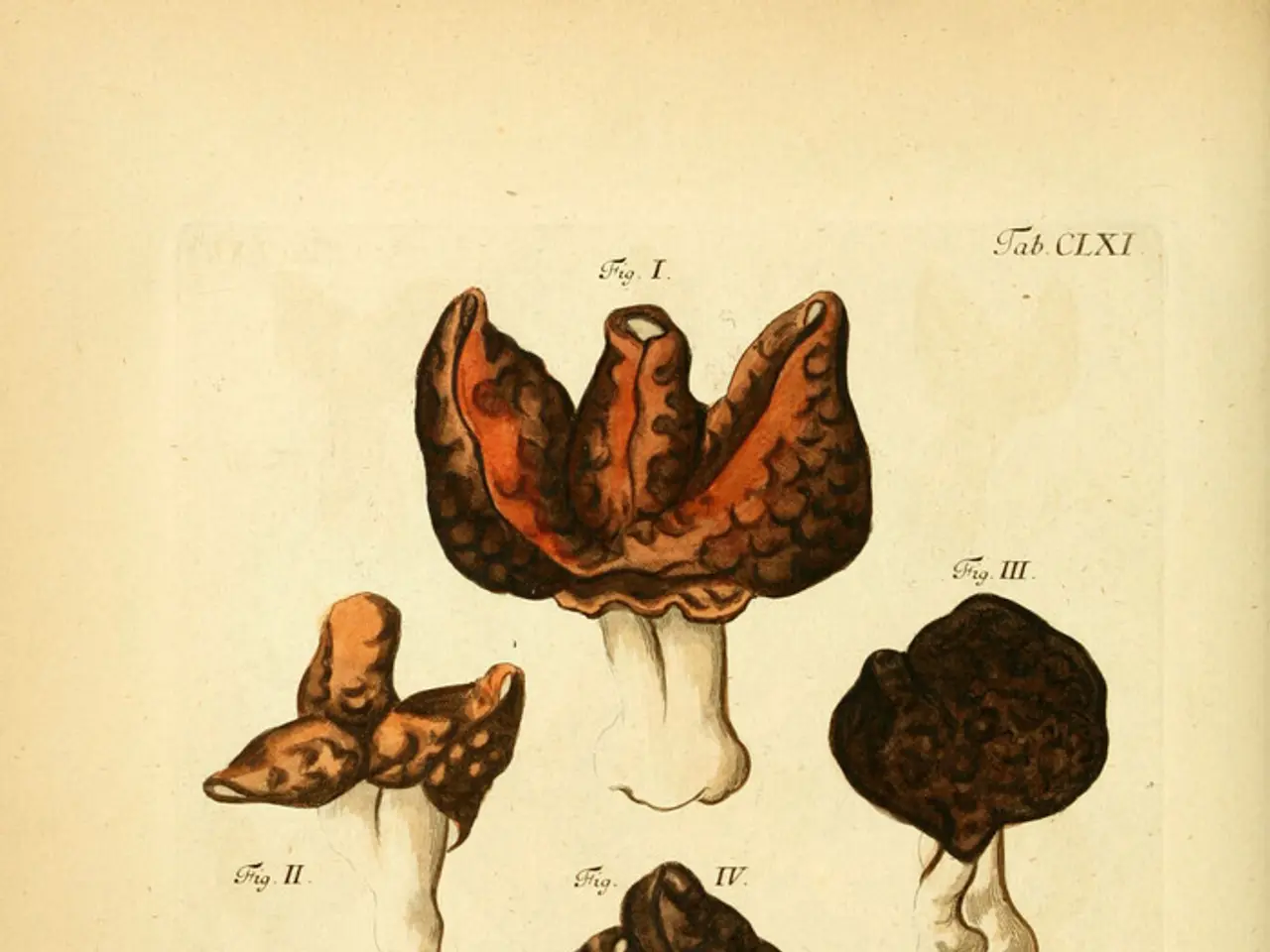Exploring Turkey Tail Mushrooms: Benefits, Risks, and Safe Usage
Turkey Tail mushrooms (Trametes versicolor) are multicoloured fungi that have been used in traditional herbal medicine for centuries and are now gaining attention for their potential benefits in cancer treatment. These mushrooms, which are plentiful in various parts of the world including the United States, contain compounds such as polysaccharopeptide (PSP) and polysaccharide-K (PSK) that have been found to support the immune system and potentially improve outcomes in certain cancers such as breast, colon, gastric, and liver cancers.
In clinical contexts, Turkey Tail extracts have been used as complementary supplements alongside conventional cancer treatments. For example, in breast cancer patients, Turkey Tail mushrooms have been shown to improve immune function post-treatment [1][2]. Similarly, in stomach, colon, and gastric cancers, PSK from Turkey Tail has been associated with increased survival times and slowing cancer cell growth when used alongside chemotherapy and radiation [2].
One of the key immune-boosting properties of Turkey Tail is its ability to promote immune function and mitigate the immune decline often seen during chemotherapy or radiation therapy [1][2]. The mushroom’s beta-glucans also exhibit anti-inflammatory properties, a critical factor since inflammation contributes to cancer development and progression. Additionally, Turkey Tail is rich in antioxidants, which help protect cells from oxidative stress linked to cancer initiation [1][2].
Turkey Tail may also positively influence gut microbiota by acting as a prebiotic, supporting a healthy digestive system and immune function, important factors in overall cancer outcomes [4]. Research in veterinary medicine has found that Turkey Tail polysaccharides can extend survival in dogs with cancer, suggesting a translational benefit that could inform human oncology [1].
It is important to note that Turkey Tail is considered a supplementary therapy rather than a cure. It is used mainly to support the body’s immune response during cancer treatment, not as a standalone treatment [3]. Safety profiles are generally favourable when taken in normal doses, but consultation with healthcare providers is essential before use, especially during cancer therapy.
Anyone with a mushroom or mold allergy should not use Turkey Tail extract, as it could cause a life-threatening reaction known as anaphylaxis. It is also crucial to follow the dosage instructions carefully, and not to take more than the label recommends. Anyone with an underlying health condition should consult a doctor before trying any new supplement, including Turkey Tail extract.
In summary, evidence supports Turkey Tail mushrooms as a beneficial complementary agent in cancer treatment through immune enhancement, anti-inflammatory and antioxidant effects, and potentially improved patient quality of life and survival in cancers such as breast, colon, gastric, and liver cancer. However, further rigorous clinical trials are needed to fully establish efficacy and optimal usage protocols [1][2][3][4]. Today, many use Turkey Tail mushrooms as a complementary treatment for cancer, and with careful consideration and guidance from healthcare professionals, it may offer hope for those battling these devastating diseases.
- In addition to its potential benefits in cancer treatment, Turkey Tail mushrooms (Trametes versicolor) may aid in managing other medical-conditions such as COPD, obesity, multiple sclerosis, ulcerative colitis, diabetes, and psoriasis due to their immune-boosting properties.
- Science has uncovered that Turkey Tail mushrooms contain compounds like polysaccharopeptide (PSP) and polysaccharide-K (PSK) which are known to support the immune system and could potentially improve outcomes for cancer patients, as well as individuals with mental-health conditions such as bipolar disorder.
- Regarding nutrition and health-and-wellness, a healthy diet rich in these medicinal mushrooms could contribute to the control of various diseases, like breast cancer, NSCLC, and even conditions outside the cancer umbrella, given their immune-enhancing properties.
- Besides cancer treatments, therapies-and-treatments for other medical-conditions, such as diabetes and mental-health disorders like bipolar, can be boosted by incorporating Turkey Tail mushrooms into one's diet, enhancing patient quality of life and overall health.
- Turkey Tail mushrooms, prioritized for their role in cancer treatment, may also offer potential benefits for medical-conditions outside the oncology spectrum, including reducing inflammation associated with autoimmune diseases like rheumatoid arthritis and alleviating symptoms of skin disorders, such as psoriasis.
- Due to Turkey Tail's antibacterial, antiviral, and anti-inflammatory properties, probiotics, and general immune-enhancing effects, it may be beneficial in managing gut-related medical-conditions, such as colitis and even promoting general health-and-wellness.
- As research into Turkey Tail's potential benefits for cancer treatment progresses, experts predict that it could become a valuable asset in the therapeutic arsenal for chronic conditions like diabetes, helping patients maintain glucose control and overall well-being.
- By analyzing the compounds present in Turkey Tail mushrooms, science may uncover innovative therapies-and-treatments for conditions like cancer, diabetes, and mental-health disorders, furthering the frontiers of medical-conditions research and advancements in health-and-wellness.
- Taking Turkey Tail mushrooms as part of a balanced, nutritious diet could have far-reaching implications for health-and-wellness, impacting the course of various medical-conditions and promoting overall longevity.
- While Turkey Tail may hold tremendous potential as a supportive therapy in cancer treatment and other medical-conditions, it should be used with caution in individuals with Mushroom allergies or other sensitive health-issues like mold sensitivity or mental-health conditions.
- As new findings on Turkey Tail's medicinal properties continue to emerge, experts in various fields—from cancer oncology to mental-health and health-and-wellness—are encouraged to explore the possibilities and develop ways to harness the potential of this multicolored mushroom to improve patient outcomes and fortify the foundation of health and wellness.




